
Home
Mission
Overview of Project
Project Staff
Sponsors
Achievements
Checking, Illustrations
Upcoming Activities
Id and Species Lists
Protea Information
Protea Gallery
Growing Proteas
Interim Dist. Maps
Publications
Afrikaanse Inligting
![]()
Skirted Spiderheads - Serrurias
Strawberry Spiderhead - Serruria aemula aemula
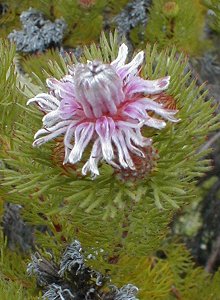 |
Habit: A straggly, much branched shrub up
to 0.5m tall Fire survival: Killed, only seeds survive Sexual system: Both sexes in each flower Flowers: July - October Pollinator: Insects Fruit: Released 2 months after flowering Seed dispersal: Ants Seed storage: Underground in ants nests Rarity status: Endangered because of urbanization Habitat: Sands, 0-70m Distribution: Cape Flats from Cape Town to Firgrove |
Strawberry Spiderhead - Serruria aemula congesta
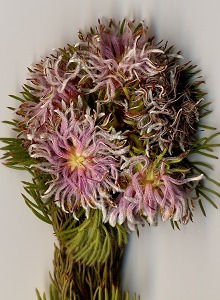 |
Habit: A straggly, much branched shrub up
to 0.5m tall Fire survival: Killed, only seeds survive Sexual system: Both sexes in each flower Flowers: July - October Pollinator: Insects Fruit: Released 2 months after flowering Seed dispersal: Ants Seed storage: Underground in ants nests Rarity status: Extinct due to urbanization Habitat: Sands, 50m Distribution: Firgrove near Somerset West |
Wynberg Spiderhead - Serruria cyanoides
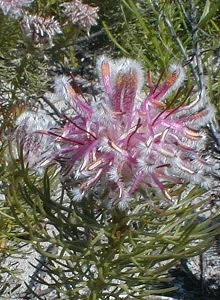 |
Habit: Multi-stemmed, with erect stems
0.3-0.5m tall Fire survival: Resprouts from an underground rootstock Sexual system: Both sexes in each flower Flowers: July - October Pollinator: Insects Fruit: Released 2 months after flowering Seed dispersal: Ants Seed storage: Underground in ants nests Rarity status: Vulnerable to extinction - eliminated from Cape Flats of Cape Town and survives only at higher altitudes in its previous distributional range. Habitat: Sandy soils, 0-150m Distribution: Cape Peninsula and Cape Flats |
Kraaifontein Spiderhead - Serruria furcellata
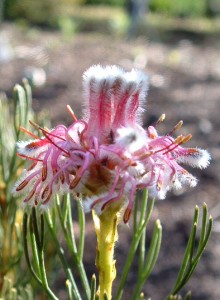 |
Habit: Multi-stemmed
erect shrub with a rootstock, up to 0.5m tall Fire survival: Resprouts from an underground rootstock Sexual system: Both sexes in each flower Flowers: August - October Pollinator: Insects Fruit: Released 2 months after flowering Seed dispersal: Ants Seed storage: Underground in ants nests Rarity status: Extinct - in cultivation at University of Western Cape and Kirstenbosch Habitat: Sands, 90-310m Distribution: Brackenfell, Kraaifontein and Kuilsriver |
Forlorn Spiderhead - Serruria scoparia
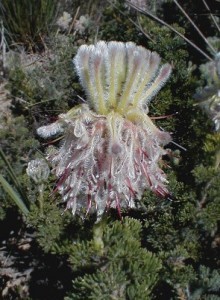 |
Habit: A sprawling shrub up to 0.5m tall Fire survival: Resprouts from an underground rootstock Sexual system: Both sexes in each flower Flowers: August - October Pollinator: Insects Fruit: Released 2 months after flowering Seed dispersal: Ants Seed storage: Underground in ants nests Rarity status: Vulnerable to extinction due to agriculture. It is known from three remnant populations numbering less than 50 plants. It was originally collected near Paarl, 25km south of the discovered populations. Habitat: Sandy alluvial soils over shale, 100m Distribution: Riebeeck-East to Paarl Note: This species was rediscovered in September, 2001 and hadn't previously been seen since 1810 |
Blushing Bride - Serruria florida
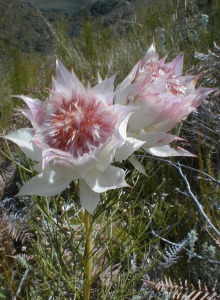 |
Habit: Spindly shrub 2 m tall Fire survival: Killed, only seeds survive Sexual system: Both sexes in each flower Flowers: July - October Pollinator: Insects Fruit: Released 2 months after flowering Seed dispersal: Ants Seed storage: Underground in ants nests Rarity status: Vulnerable - only known from a few stands at one site on the edge of pine plantations Habitat: Granite-derived soils, 600-620m Distribution: Assegaaiboskloof near Franshhoek |
Graceful Spiderhead - Serruria gracilis
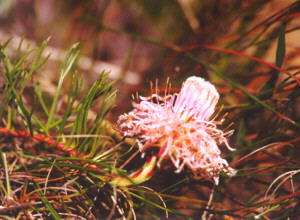 |
Habit: Prostrate shrub 0.05 - 0.1m tall Fire survival: Resprouts from an underground rootstock Sexual system: Both sexes in each flower Flowers: July - October Pollinator: Insects Fruit: Released 2 months after flowering Seed dispersal: Ants Seed storage: Underground in ants nests Rarity status: Rare, isolated populations of scattered plants Habitat: Sands and granite slopes, 150-310m Distribution: Cape Flats at Durbanville to Hottentots Holland and Du Toits Kloof Mountains |
Spindly Spiderhead - Serruria heterophylla
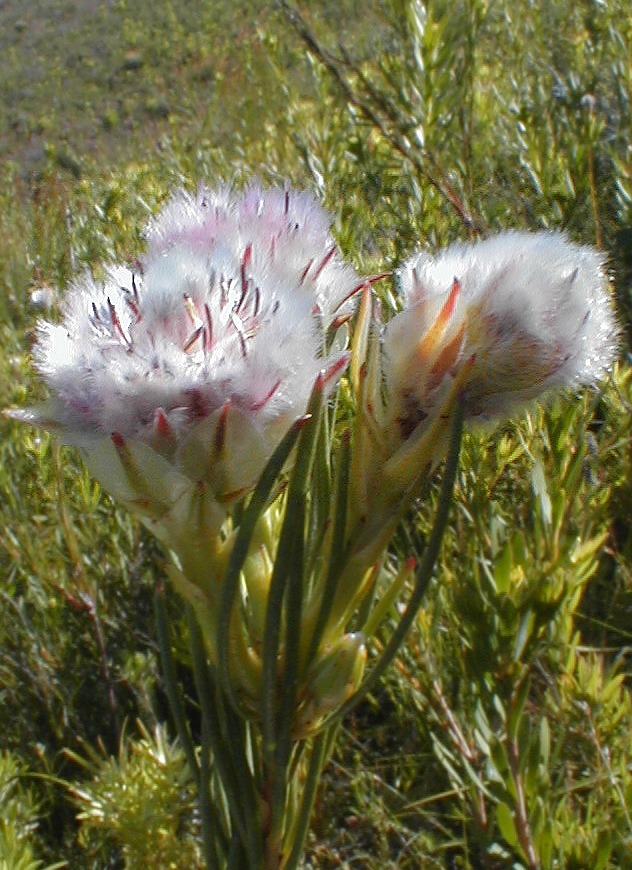 |
Habit: An erect shrub up to
1m tall Fire survival: Killed, only seeds survive Sexual system: Both sexes in each flower Flowers: July - October Pollinator: Insects Fruit: Released 2 months after flowering Seed dispersal: Ants Seed storage: Underground in ants nests Rarity status: Rare, a highly social species known from 2 major populations Habitat: Sandstone soils, 90-310m Distribution: Kleinmond and Klein River Mountains, with a possible record from Caledon Swartberg |
Needle-leaf Spiderhead - Serruria linearis
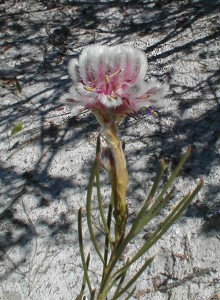 |
Habit: An erect shrub up to 0.8m tall Fire survival: Resprouts from an underground rootstock Sexual system: Both sexes in each flower Flowers: August - November Pollinator: Insects Fruit: Released 2 months after flowering Seed dispersal: Ants Seed storage: Underground in ants nests Rarity status: Endangered owing to agriculture and invading acacias Habitat: Sands, 120-190m Distribution: Dassenberg Flats near Malmesbury |
Bearded Spiderhead - Serruria phylicoides
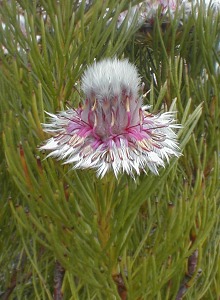 |
Habit: Spindly shrub 1m tall Fire survival: Killed, only seeds survive Sexual system: Both sexes in each flower Flowers: August - November Pollinator: Insects Fruit: Released 2 months after flowering Seed dispersal: Ants Seed storage: Underground in ants nests Rarity status: Not threatened Habitat: Sandstone sands, slopes and flats, 330-1800m Distribution: Du Toit's Kloof to Hottentots-Holland to Riviersonderend and Klein River Mountains |
Graceful Spiderhead - Serruria pinnata
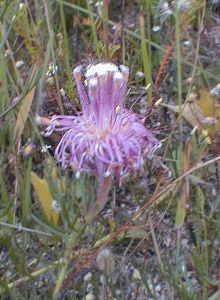 |
Habit: Prostrate shrub 0.05 - 0.1m tall Fire survival: Resprouts from an underground rootstock Sexual system: Both sexes in each flower Flowers: July - October Pollinator: Insects Fruit: Released 2 months after flowering Seed dispersal: Ants Seed storage: Underground in ants nests Rarity status: Endangered, only one population of 20 plants could be relocated in 2001 Habitat: Sands and granite slopes, 80-100m Distribution: Cape Flats at Durbanville to Hottentots Holland Mountains Note: Although this species is not recognized in the latest catalogue of Cape Flora plants, it is quite distinct from its sister species Serruria gracilis, in having thick sprawling stems (ie. not a mat) and bigger flowerheads with distinct pollen presenter markings on the upper perianth. |
Rose Spiderhead - Serruria rosea
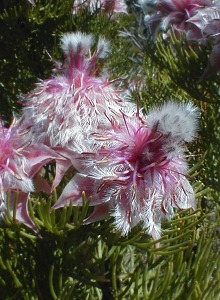 |
Habit: An erect shrub 0.8-1.5m tall Fire survival: Killed, only seeds survive Sexual system: Both sexes in each flower Flowers: August - October Pollinator: Insects Fruit: Released 2 months after flowering Seed dispersal: Ants Seed storage: Underground in ants nests Rarity status: Dense isolated stands Habitat: Sandy soils, 300-620m Distribution: Slanghoek to Franschhoek in the Hottentot Holland Mountains |
Star Spiderhead - Serruria stellata
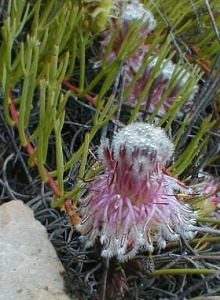 |
Habit: A prostrate shrub with creeping
stems up to 0.2m tall Fire survival: Killed, only seeds survive Sexual system: Both sexes in each flower Flowers: September - November Pollinator: Insects Fruit: Released 2 months after flowering Seed dispersal: Ants Seed storage: Underground in ants nests Rarity status: Locally abundant Habitat: Sandstone sands, 900-1200m Distribution: Western Riviersonderend Mountains from Wolfieskop to Jonaskop |
Trident Spiderhead - Serruria trilopha
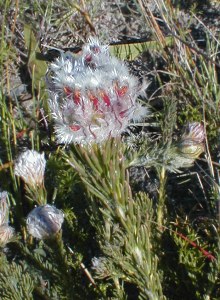 |
Habit: A sprawling, multi-stemmed shrub
with a rootstock up to 0.8m tall Fire survival: Resprouts from an underground rootstock Sexual system: Both sexes in each flower Flowers: August - October Pollinator: Insects Fruit: Released 2 months after flowering Seed dispersal: Ants Seed storage: Underground in ants nests Rarity status: Endangered, owing to urbanisation and agriculture Habitat: Sands sands, 50-310m Distribution: Cape Peninsula and Cape Flats to Malmesbury |
Back Spiderhead Gallery